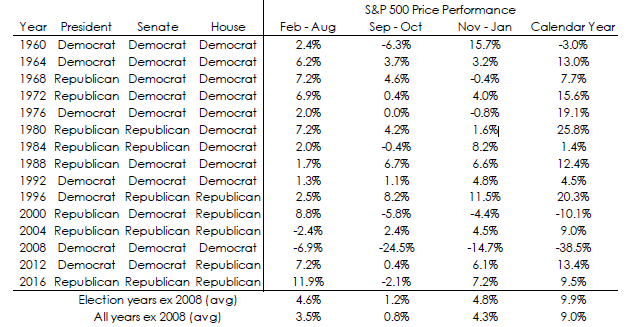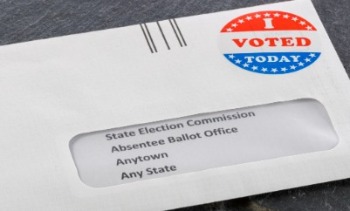The election season is upon us, once again. With the recent confirmation that Democratic nominee Joe Biden has been selected to face President Donald Trump in the 2020 presidential election, we want to take this opportunity to address a few of the most frequent questions our team has received.
.jpg)
Election years arrive accompanied by a significant wave of uncertainty. With the 2020 presidential election less than 90 days away, Americans are, of course, asserting their personal predictions as to who will win the election. Based on current national polls (as of August 17th), Democratic nominee Joe Biden leads President Donald Trump 51% to 42%. Though this may appear to be a significant lead, history has proven early poll predictions do not offer a guarantee as to who will win come Election Day. During approximately this same time in 2016, Democratic nominee Hillary Clinton led Republican nominee Donald Trump in national polls 50% to 41%. As we all know, President Trump ultimately won the election, proving early election polls are not always a guaranteed sign of victory.
Americans have been asking the same question for decades: Do the markets perform better under a Democratic or Republican president? Although you may feel an allegiance to a particular political party, party control actually has little influence on your portfolio’s performance. One might suggest that Republican policies are traditionally more business-friendly than Democratic polices and, as a result, a Republican held office may be more beneficial for stock holdings. However, based on historical trends dating back to 1900, the stock market has, in fact, performed better under Democrats.
Since 1900, the Dow Jones Industrial Average has been up an average of nearly 9% annually when Democrats are in control, compared to nearly 6% per year during Republican administrations. However, this data is impacted by the Hoover Presidency (Republican) during the Great Depression leading to average annual returns of -27.19%. As demonstrated in the table below provided by our research partner ACG, in general, the party controlling the White House has insignificant trending impact on overall market performance.

Investors may be better off considering the market’s influence on election outcomes. Since 1928, the following trend has has held true, with only three exceptions: When the S&P 500 rises in the three months prior to an election, the incumbent party has won the upcoming election. When the opposite occurs and the S&P 500 falls in the months prior to an election, the incumbent party has lost.
Finally, be aware there may be a significant drop in the markets should the election results be delayed due to a lag in vote-by-mail ballots amid the COVID-19 pandemic. Following the contested election in 2000, when President George W. Bush defeated Democratic nominee Al Gore, markets fell 12% from Election Day to a low in December when Florida finally confirmed their election results. Regardless of which candidate is predicted to be the winner on November 3rd, it is possible true victory may not be confirmed for several weeks.
Biden Tax Policies
Biden has discussed many proposed tax policies he would like to pursue if elected. Proposals include increasing corporate tax rates from 21% to 28%. In addition, corporations would be subject to a 15% minimum tax on profits reported to investors.
Regarding individual taxes, Biden suggests raising the top ordinary income tax rate from 37% to 39.6% for individuals. He proposes taxing capital gains at the same rate as ordinary income for households earning more than $1 million; increasing the top capital gains tax rate to 39.6% from 20%.
In addition, Biden proposes repealing the “step-up in basis” provision for estates. This provision allows beneficiaries of an estate to sell assets from the estate without paying gains that accrued while the deceased was alive. Under Biden’s proposal, unrealized capital gains that accrued would taxed by the estate upon transfer to heirs.
Will the COVID-19 Pandemic Impact the Election?

During these uncertain times, there have been many changes to the upcoming election attributed to the ongoing COVID-19 pandemic. Vote-by-mail has become a hot topic, as it keeps people safe and socially distanced, but is likely to impact the election. It is predicted that mail-in voting may increase the voter turnout for specific demographics such as minorities, immigrants, and young people – all who historically tend to vote Democrat. For states that do not implement vote-by-mail systems, the opposite is likely to occur.
Social distancing guidelines are forcing atypical campaigning. Historically, candidates built enthusiasm and support through rallies, conventions and in-person fundraisers. In order to keep Americans safe, many of these events have been cancelled, or attendance significantly reduced. Will this affect voter turnout on November 3rd? Probably not. A long-standing political doctrine states that presidential campaigns have a marginal effect on voting decisions.
However, some speculate the pandemic may reduce voter registration. Volunteers with registration forms typically frequent political rallies and colleges to register voters. However, opportunities for these in-person strategies have been greatly reduced due to social distancing guidelines.
Here to Help
Although there is much uncertainty during these unusual times, Parkside is here to support you, your family and your business. No matter which party wins the election, market fluctuations and new policies are likely ahead. However, the allocation of your investments bears greater influence on your long-term financial growth than any election results. Rest assured, we are diligently monitoring the political climate to ensure we are well-prepared for what is to come.
As always, please contact our team should you have any questions regarding your portfolio.
Smart Financial Decisions for Your College Student
On August 5th, Parkside offered a live webinar discussing tips and tricks for making wise financial decisions during the college years.
Parkside Financial Advisor, Amy Brand, CFA®, and our 2020 Summer Intern panel, shared valuable information regarding:
• The Importance of Budgeting
• Security and Fraud Prevention Tips and Tools
• Credit and Debit Card Responsibility
• Building Strong Credit
we invite you to view a replay of the webinar using the link below.
Parkside Financial Bank & Trust is not a tax advisor. All decisions regarding the tax implications of your investments should be made in consultation with your independent tax advisor. We will work with you independent tax and/or legal advisor(s) to help create a plan tailored to your specific needs. The material contained herein is for informational purposes only and does not constitute tax advice.


